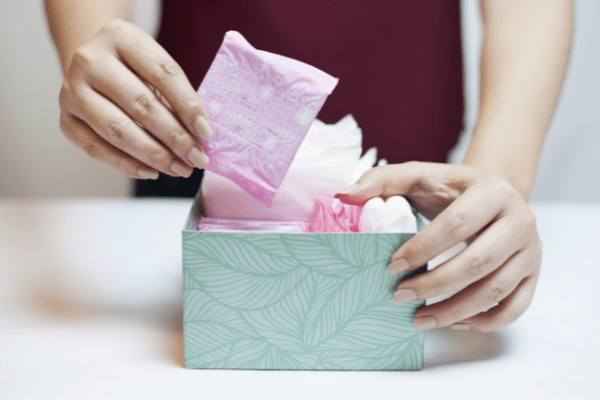Australian boys and young men find menstruation “messy”, “emotional”, “dirty”, “disgusting”, and “impure”, according to new research from Plan International Australia.
The research looked at the impacts of period stigma on Australian girls and the consequences of a lack of education for boys at an early age when it comes to menstruation.
Plan Australia commissioned You Gov for the survey, talking to over 300 Australian young men aged 16-21 years from around the country.
The research revealed over a third of Australian boys and young men are not informed at all about menstruation, while almost half said their school education on menstruation and menstrual health was poor or non-existent.
Almost a quarter of respondents said they associate menstruation with being ‘dirty’. One-in-five even said they are ‘disgusting’.
Roughly one-in-five said they thought periods should be kept secret and almost 15 percent said they thought periods were “impure”.
Forty two percent of the respondents said they have seen or heard another man making negative comments about periods either directly or indirectly about a woman.
When the respondents were asked why they felt uncomfortable talking about periods, they said they felt “awkward”, “uneasy”, “weird”, “anxious” and “gross.”
Susanne Legena, CEO of Plan International Australia, believes the consequences of this stigma is far reaching for girls.
“Girls are missing school, being bullied and dealing with distress – all because we are not talking enough about periods, particularly with boys,” she said.
“While gender inequality may disproportionately affect women and girls, it also directly impacts men and boys too. No boy should feel he has to live up to a certain image or behaviour, to fulfil the stereotype of what it means to be a man.”
“Addressing the unique barriers and challenges that prevent girls and women from reaching their full potential, such as period shame and taboos, is one of the most effective ways to create gender equality for all people around the world.”
In April, a survey found almost a third of Australian girls are missing school because they are embarrassed about their periods. Almost half of those aged 10-18 said they were afraid of being teased.
Menstrual health is a key issue that Plan International focuses on in more than 80 countries, and the good news is that early intervention can be transformative.
The charity has teamed up with period care brand U By Kotex to call for greater and earlier education about periods in schools.
An 18-year-old male from South Australia was quoted in the report, saying he feels “…uncomfortable talking about something that I do not fully understand.”
A 19-year old Victorian male echoed this sentiment, adding “I am not a woman and male involvement with this topic is usually seen as perverted and unnecessary.”
Plan International Australia ambassador Benjamin Law said his early education on periods came from his single mother and three sisters.
“When you’re raised in a household of strong no-bull women, you learn about periods,” he said.
“With five kids sharing one bathroom – and as a family member who was sometimes sent out to buy sanitary pads from the supermarket – periods weren’t really a mystery to me growing up.
“Yet I know my family’s an outlier. So many people of all genders still regard a healthy and regular function of the human body as shameful, dirty or embarrassing. And that stigma needs to be eradicated.”
22-year year old Elizabeth Payne is a Plan International Australia youth activist, who was teased about her menstruation in high school.
“[The boys] often say ‘she must be on her period’, usually behind our backs or about someone who wasn’t in the conversation,” she said. “Many boys equated periods to defecating or urinating, and something that shouldn’t be openly talked about, but some were genuinely curious.”
“I also distinctly remember boys asking girls for unused tampons and putting them in bottles of water to see them expand. This curiosity could have been captured by the school and transformed into a great learning moment, but instead they were told that this was inappropriate and got in trouble.”
Like many women, Payne said she missed school because of period stigma and shame.
“Part of why I stayed home was the fear that I would bleed through my pad and boys would see, and I would be marked for the rest of high school as that girl who bled on her school skirt.”
“The idea that we have to ‘manage’ our periods, and ourselves, is wrapped up in misogyny, that we have to keep our periods and our pain hidden from the eyes of others, particularly men, or we are seen as unprofessional, or a mess.”
Plan International Australia has also partnered with Kimberly-Clark in their commitment to changing the conversation around periods.
The Melbourne-based charity have developed targeted educational programs aimed at boys in schools and communities in Australia and across around the world.
Plan International’s WASH program (Water, Sanitation and Hygiene) dispatch professionals across 80 countries, distributing menstrual hygiene materials and educating young people about the menstrual cycle.
Local governments and schools collaborate with Plan International to train district health workers, teachers and volunteers to educate young people about periods and discuss them in a shame-free environment.
U by Kotex is owned by Kimberly-Clark, an American multinational personal care corporation that is working towards educating five million people across Australia and NZ to fight menstrual stigma and alleviate period poverty for 500,000 women and girls by 2030.
The U by Kotex ‘What’s Happening to You’ menstrual education program is frequently cited as a useful teacher resource, with more than one million students participating in the program since its inception in 2015.


